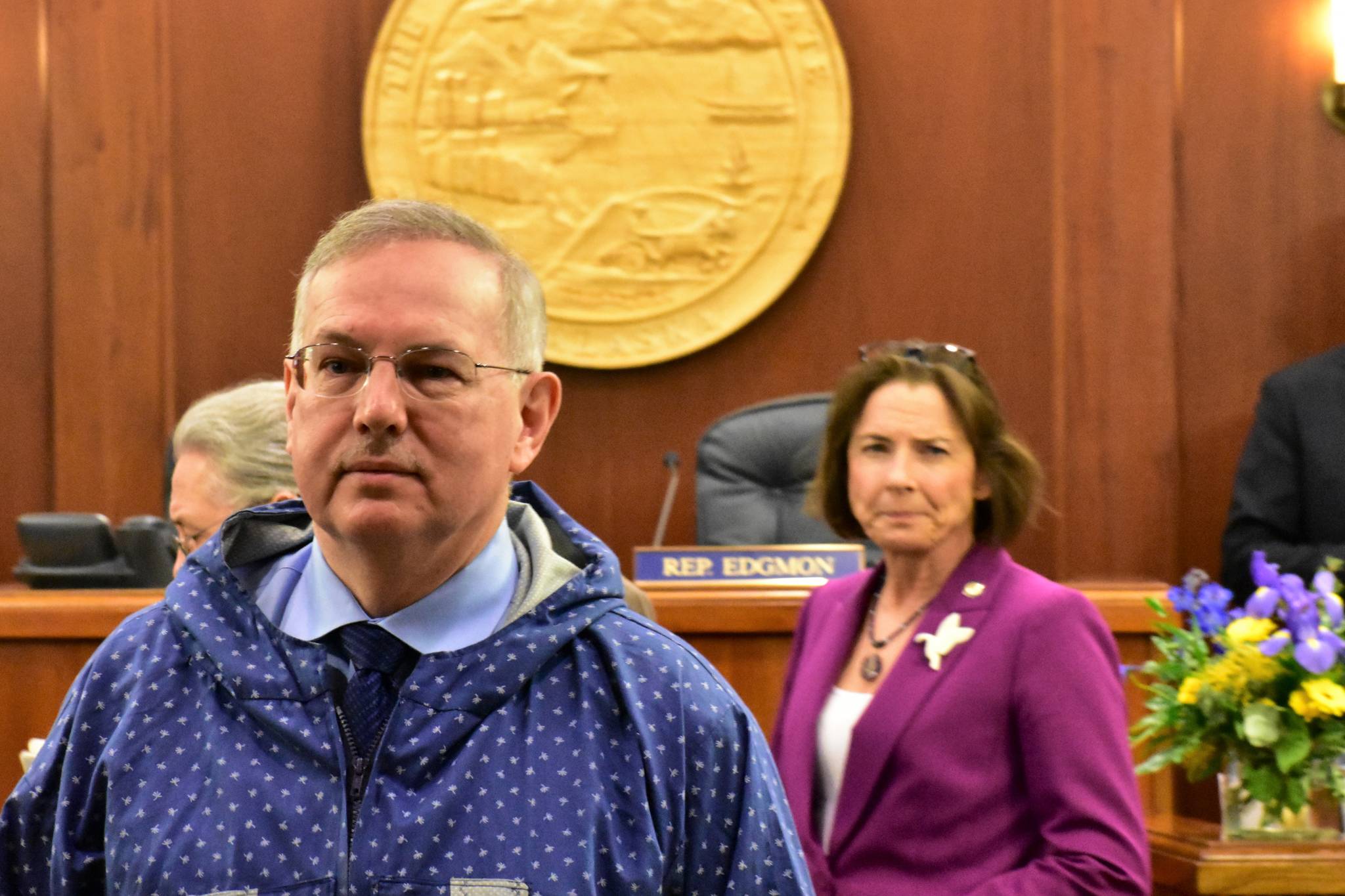In a repeat of the summer’s special session, the Legislature once again failed to get the 45 votes necessary to override Gov. Mike Dunleavy’s line-item vetoes of the 2020 budget.
In a joint session Friday morning, lawmakers from both the House and Senate gathered in House chambers to debate the issue, which had taken up much of the summer.
Friday’s vote was more focused, with only three items on the table: the Alaska Marine Highway System, school bond debt reimbursement and regional area education funding.
Had the vote succeeded, it would have restored $5 million to AMHS, just under $50 million for school bond debt reimbursement, and just under $20 million to regional area education funding, according to the text of the bill.
In the end, votes fell along roughly the same lines as the summer’s special session. A minority of Republican lawmakers voted against the overrides, ending in a vote of 37 yeas and 20 nays. In the Senate there were 13 yeas, 6 nays; and in the House 24 yeas, 14 nays.
Meeting with reporters following the vote, Senate President Cathy Giessel said she felt the joint session was still worth it.
“The discussion was important,” Giessel said. “It was important that legislators had that opportunity to express their views, and for the public to understand what school bond debt reimbursement veto meant for their communities.”
In a statement, House Speaker Bryce Edgmon said it was important for Alaskans to know where their lawmakers stood. “Today, we saw clearly that most legislators stand with the Alaska Marine Highway System, and for keeping the financial commitments the state made to local communities,” Edgmon said Friday. “The governor’s vision does not support the level of services it takes to build the Alaska our children and elders deserve.”
On the floor of the House, opponents to the overrides said they were sympathetic to the goals of their colleagues, but that the state was not in a position to fund the programs in question.
“We have a One. Point. Five. Billion, dollar deficit,” said Sen. Shelley Hughes, R-Palmer. “We make lifestyle choices. When you chose to live where those no roads, you know there’s consequences to that.”
Sen. Lora Reinbold, R-Eagle River, said that while she agreed the lack of school bond debt reimbursement would most likely mean higher property taxes, every Alaskan had $1,600 taken out of their pockets in the form of a reduced permanent fund dividend.
In a statement, House Minority Leader Lance Pruitt, R-Anchorage, said voting yes would have undermined ongoing negotiations with the governor over the budget.
“Today’s vote was about nothing more than creating material to use against other members in the next election cycle,” Pruitt said. “The House and Senate leadership knew that they didn’t have the votes to be successful, yet they moved forward anyway, failing to consider the concerns of conservatives who are serious about being guardians of good government and fiscal restraint.”
Giessel said she and her colleagues were waiting to see the governor’s proposals for his supplemental budget. That budget would add roughly $300 million to the FY20 budget, Giessel said, but it’s not yet clear what that budget will fund.
Sen. John Coghill, R-North Pole, who met with reporters alongside Giessel, said he believed the governor would propose more money for the marine highway.
The supplemental budget is due on Feb. 13, Giessel said, but added she had been told Dunleavy would try and get the budget to the Legislature sooner.
“We’re interested in hearing what his plan is going forward, his long-term vision for the state,” Giessel said. “Where will the funding be going for those critical things of education, transportation and public safety?”
[A change in the PFD formula? Some lawmakers think it could happen this session]
When he released his budget, Dunleavy said he wanted to look at some of the formula-driven spending that are set in statute. As the lawmaking body, the Legislature would be in charge of making those changes.
But the governor’s priority of paying out a full-statutory PFD is not something Giessel and Coghill said they were willing to consider.
“It is not a viable option in our opinion,” Giessel said. “We do not want to use three-quarters of the last savings account to fund this year’s budget because it is not a visionary plan.”
The question of what to do with the PFD is what Coghill called a $2 billion question.
Reworking the formula has only been mentioned so far but concrete discussions have not yet begun, Giessel said.
“We have yet to answer (the PFD question),” Coghill said. “So my guess is you’ll see that at the front of every discussion.”
• Contact reporter Peter Segall at 523-2228 or psegall@juneauempire.com.

